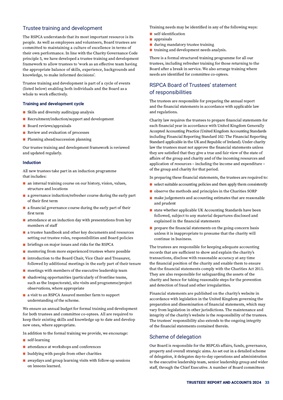
TRUSTEES' REPORT AND ACCOUNTS 2024 33
Trustee training and development
The RSPCA understands that its most important resource is its
people. As well as employees and volunteers, Board trustees are
committed to maintaining a culture of excellence in terms of
their own performance. In line with the Charity Governance Code
principle 5, we have developed a trustee training and development
framework to allow trustees to 'work as an effective team having
the appropriate balance of skills, experience, backgrounds and
knowledge, to make informed decisions'.
Trustee training and development is part of a cycle of events
(listed below) enabling both individuals and the Board as a
whole to work effectively.
Training and development cycle
• Skills and diversity audits/gap analysis
• Recruitment/induction/support and development
• Board reviews/appraisals
• Review and evaluation of processes
• Planning ahead/succession planning
Our trustee training and development framework is reviewed
and updated regularly.
Induction
All new trustees take part in an induction programme
that includes:
• an internal training course on our history, vision, values,
structure and locations
• a governance induction/refresher course during the early part
of their first term
• a financial governance course during the early part of their
first term
• attendance at an induction day with presentations from key
members of staff
• a trustee handbook and other key documents and resources
setting out trustee roles, responsibilities and Board policies
• briefings on major issues and risks for the RSPCA
• mentoring from more experienced trustees where possible
• introduction to the Board Chair, Vice Chair and Treasurer,
followed by additional meetings in the early part of their tenure
• meetings with members of the executive leadership team
• shadowing opportunities (particularly of frontline teams,
such as the Inspectorate), site visits and programme/project
observations, where appropriate
• a visit to an RSPCA Assured member farm to support
understanding of the scheme.
We ensure an annual budget for formal training and development
for both trustees and committee co-optees. All are required to
keep their existing skills and knowledge up to date and develop
new ones, where appropriate.
In addition to the formal training we provide, we encourage:
• self-learning
• attendance at workshops and conferences
• buddying with people from other charities
• awaydays and group learning visits with follow-up sessions
on lessons learned.
Training needs may be identified in any of the following ways:
• self-identification
• appraisals
• during mandatory trustee training
• training and development needs analysis.
There is a formal structured training programme for all our
trustees, including refresher training for those returning to the
Board after a break in service. We also arrange training where
needs are identified for committee co-optees.
RSPCA Board of Trustees' statement
of responsibilities
The trustees are responsible for preparing the annual report
and the financial statements in accordance with applicable law
and regulations.
Charity law requires the trustees to prepare financial statements for
each financial year in accordance with United Kingdom Generally
Accepted Accounting Practice (United Kingdom Accounting Standards
including Financial Reporting Standard 102: The Financial Reporting
Standard applicable in the UK and Republic of Ireland). Under charity
law the trustees must not approve the financial statements unless
they are satisfied that they give a true and fair view of the state of
affairs of the group and charity and of the incoming resources and
application of resources - including the income and expenditure -
of the group and charity for that period.
In preparing these financial statements, the trustees are required to:
• select suitable accounting policies and then apply them consistently
• observe the methods and principles in the Charities SORP
• make judgements and accounting estimates that are reasonable
and prudent
• state whether applicable UK Accounting Standards have been
followed, subject to any material departures disclosed and
explained in the financial statements
• prepare the financial statements on the going-concern basis
unless it is inappropriate to presume that the charity will
continue in business.
The trustees are responsible for keeping adequate accounting
records that are sufficient to show and explain the charity's
transactions, disclose with reasonable accuracy at any time
the financial position of the charity and enable them to ensure
that the financial statements comply with the Charities Act 2011.
They are also responsible for safeguarding the assets of the
charity and hence for taking reasonable steps for the prevention
and detection of fraud and other irregularities.
Financial statements are published on the charity's website in
accordance with legislation in the United Kingdom governing the
preparation and dissemination of financial statements, which may
vary from legislation in other jurisdictions. The maintenance and
integrity of the charity's website is the responsibility of the trustees.
The trustees' responsibility also extends to the ongoing integrity
of the financial statements contained therein.
Scheme of delegation
Our Board is responsible for the RSPCA's affairs, funds, governance,
property and overall strategic aims. As set out in a detailed scheme
of delegation, it delegates day-to-day operations and administration
to the executive leadership team, senior leadership group and wider
staff, through the Chief Executive. A number of Board committees